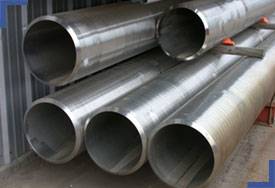Stainless steel welded pipes are integral components in various industries due to their durability, versatility, and ability to withstand harsh conditions. This blog delves into what stainless steel welded pipes are, their unique characteristics, and the wide array of applications where they excel.
What is Stainless Steel Welded Pipe?
Stainless steel welded pipes are manufactured by welding stainless steel plates or coils together to form a seamless, continuous tube. This process involves heating the edges of the steel plates or coils to their melting point and then fusing them together under pressure. The welded seam is typically less noticeable than that of seamless pipes and offers excellent structural integrity and strength.
Key Features of SS Welded Pipe
- Strength and Durability: SS welded pipes are known for their strength and durability, making them suitable for applications requiring high pressure and structural integrity.
- Corrosion Resistance: They exhibit excellent resistance to corrosion, making them ideal for use in environments with exposure to moisture, chemicals, and corrosive substances.
- Cost-Effective: Welded pipes are generally more cost-effective than seamless pipes, making them a preferred choice for applications where high volumes or large diameters are required.
- Versatility: SS welded pipes can be manufactured in a wide range of sizes, shapes, and thicknesses to suit various industrial and commercial applications.
Applications of Stainless Steel Welded Pipe
Stainless steel welded pipes find extensive applications across multiple industries:
- Construction: Used in building structures, handrails, and architectural components where strength, durability, and aesthetic appeal are essential.
- Oil and Gas: Critical for pipelines, refineries, and petrochemical plants due to their ability to transport oil, gas, and other fluids safely and efficiently.
- Automotive: Used in exhaust systems, automotive frames, and structural components due to their resistance to heat and corrosion.
- Food and Beverage: Hygienic and easy to clean, welded pipes are used in food processing equipment, beverage production, and dairy processing plants.
- Water Treatment: Employed in water supply and wastewater treatment systems due to their corrosion resistance and longevity.
Advantages of Stainless Steel Welded Pipe
- Customization: They can be tailored to specific project requirements in terms of size, thickness, and configuration.
- Ease of Fabrication: Welded pipes are easier to fabricate and install compared to seamless pipes, reducing labor and installation costs.
- Environmental Sustainability: Stainless steel is 100% recyclable, making welded pipes an environmentally friendly choice for sustainable development.
Conclusion
Stainless steel welded pipes are indispensable in modern industry, offering durability, corrosion resistance, and cost-effectiveness. Their versatility allows them to be used in a wide range of applications across construction, automotive, oil and gas, and food processing industries. Understanding the advantages and applications of stainless steel welded pipes helps industries make informed decisions to enhance efficiency, durability, and performance in their operations. As technology advances and demand grows, stainless steel welded pipes continue to play a pivotal role in shaping the future of industrial infrastructure worldwide.


